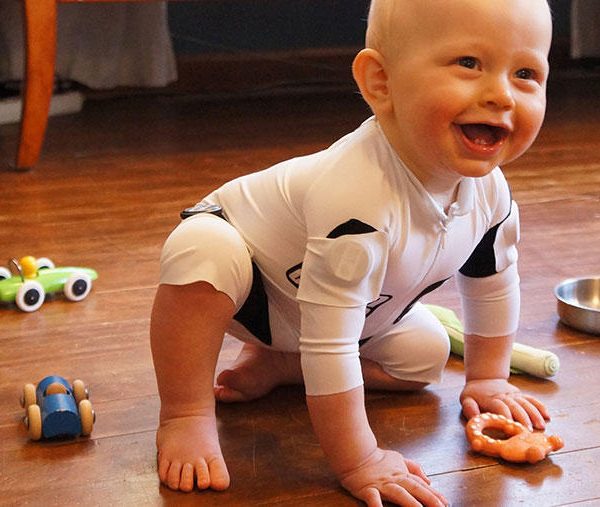UOW researcher finds tummy time is key to meeting motor movement milestones

While the benefits of ‘tummy time’ – placing a baby on their stomach for play – have been widely discussed, one University of Wollongong (UOW) researcher has undertaken a systemic review, which shows the specific aspects of motor development improved by the practice, including rolling, crawling and other motor development milestones.
Following the review, research is now available to demonstrate that tummy time improves total development and gross motor development, and prevents brachycephaly (where the back of an infants’ head is flattened as a result of spending a lot of time on their backs).
The aspects of motor development (a child’s ability to move around) that tummy time was found to improve were the ability to move while prone (on their tummy) or supine (on their back), including rolling and crawling. An indeterminate association was found for social and cognitive development, and for walking, standing, and sitting. No association was found for fine motor development and communication.
When infants are placed on their tummy, they are given the opportunity to practice lifting up their head, lifting up and turning their head, moving their legs and pushing up with their arms, strengthening the infant’s head, neck, shoulder and trunk muscles which they will need to master motor skills such as their overall ability to move, crawl and roll.
Dr Lyndel Hewitt conducted the review, which examined 16 research articles involving 4,237 participants from eight countries.
“Motor development encompasses many aspects. Being able to say ‘tummy time assists with your baby’s ability to roll’ is a more concrete way of explaining the benefits of tummy time to parents and health care providers,” Dr Hewitt said.
Current World Health Organisation guidelines for physical activity, sedentary behaviour and sleep for all children under the age of five years recommend infants get 30 minutes of tummy time over a 24-hour period.
“My advice is to start small (30 seconds) and gradually increase the time a baby spends in tummy time. It is important to remember that the baby must be awake and supervised by their parent or carer during tummy time,” Dr Hewitt said.
“Parents are advised to see their doctor, paediatrician or physiotherapist for a motor development assessment to determine if their baby is meeting their milestones.”
Dr Hewitt said that further studies using more objective methods were needed to further assess the health outcomes of tummy time, including studies investigating the effect of tummy time on fine motor skills, walking, standing, sitting and cognition.
“Most studies that were included in this review were observational in design, which means there was not a group of baby’s receiving other interventions to compare the results to, and they used questionnaires to determine the amount of tummy time the baby received,” she added.
“More studies are needed using a more rigorous design method and more objective ways to measure the amount of tummy time the babies received.”
To read ‘Tummy Time and Infant Health Outcomes: A Systematic Review’ by Lyndel Hewitt, Erin Kerr, Rebecca M. Stanley, and Anthony D. Okely as published in Pediatrics on 5 May 2020 please see here.
Popular

Practice
Provider
Quality
Research
Workforce
New activity booklet supports everyday conversations to keep children safe
2025-07-10 09:00:16
by Fiona Alston

Quality
Practice
Provider
Research
Workforce
Honouring the quiet magic of early childhood
2025-07-11 09:15:00
by Fiona Alston

Quality
Practice
Provider
Workforce
Reclaiming Joy: Why connection, curiosity and care still matter in early childhood education
2025-07-09 10:00:07
by Fiona Alston












